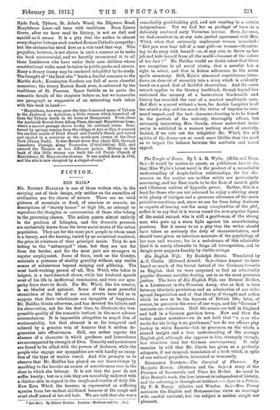FICTION.
RED Harm
MIL ROBERT HALIFAX is one of those writers who, in the carrying out of their design, rely neither on the amenities of civilization nor the charm of nature. There are no vivid pictures of mountain or flood, of sunrises or sunsets, no descriptions of "stately homes" or high life, no attempt to reproduce the thoughts or conversation of those who belong to the governing classes. The action passes almost entirely in the purlieus of Islington, and the dramatis personae are exclusively drawn from the lower social strata of the urban population. They axe for the most part people to whom meat is a luxury, and the herring, varied by an occasional mackerel, the piece de resistance of their principal meals. They do not belong to the "submerged" class, but they are not far from the border, and for the moat part are strangers to regular employment. Some of them, such as the Gundys, maintain a pretence of shabby gentility without any visible means of subsistence beyond cadging and pilfering. The
most hard-working person of Mrs. Whirl, who takes in lodgers, is a hard-hearted shrew, while her husband spends most of his life in ineffectual rumination, and wins our sym- pathy from start to finish. For Mr. Whirl, like his creator, is en idealist and optimist. Some of the most powerful chroniclers of the life of our mean streets have led us to suppose that their inhabitants are incapable of happiness. Mr. Halifax thinks otherwise, and has devoted his talents and his observation, not for the first time, to illustrate the irre- pressible.quality of the romantic instinct in the most adverse circumstances. It is impossible altogether to acquit him of sentimentality, but that element is no far tempered and relieved by a genuine vein of humour that it seldom de- generates into effusiveness. Still, one rather regrets the absence of a character in which goodness and benevolence are accompanied by strength of fibre. Tenacity and persistence are found to be allied with the powers of darkness, while the people who engage our• sympathies are with hardly an excep- tion of the type of weaker vessel. And this prompts us to observe that Mr. Halifax has played on our heartstrings by ascribing to the heroine an excess of sensitiveness rare in the class to which she belongs. It is not that the poor do not suffer keenly; but as a rule they are mercifully endowed with a thicker skin in regard to the rough-and-tumble of daily life. Now Kate Whirl, the heroine, is represented as suffering agonies from her earliest childhood because of the rough and cruel chaff aimed at her red hair. We are told that she was a
• Eva Heir. By Bohai. Halifax. Leaden Methuen and Co- reod remarkably good-looking girl, and not wanting in a certain independence?. Yet we find her as prodigal of tears an a delicately nurtured early Victorian heroine. Here, for once, we find ourselves in, at any rate, partial agreement with Mrs. Whirl, when that extremely unpleasant woman remarked "Did you ever hear tell of a sane girl—or woman—threaten- ing to do away with herself—or, at any rate, to throw up her job and hide herself from all the world—because of the colour of her hair 1" Mr. Halifax would no doubt retort that there are exceptions in all social strata, that a novelist has a right to select, and that in fiction adherence to the norm spells monotony. Still, Kate's abnormal sensitiveness intro- duces an element of unreality into a story which is evidently based on a good deal of faithful observation. And the same remark applies to the literary bootblack, though legend has enshrined the memory of a harmonious blacksmith and history has recorded the case of a musical small-coals man. Bed Hair is a novel without a hero, for Archie Lunphier is of too mixed a clay and too much the victim of impulse to com- mand respect, and the best character-drawing is to be found in the portrait of the unlovely, thoroughly odious, but extremely interesting Mrs. Gundy, whose malevolent Main- eerity is exhibited in a manner nothing short of masterly. Indeed, if we rule out the delightful Mr. Whirl, the evil spirits of the drama are so much more lifelike than the good as to impair the balance between the aesthetic and moral appeal.






































 Previous page
Previous page